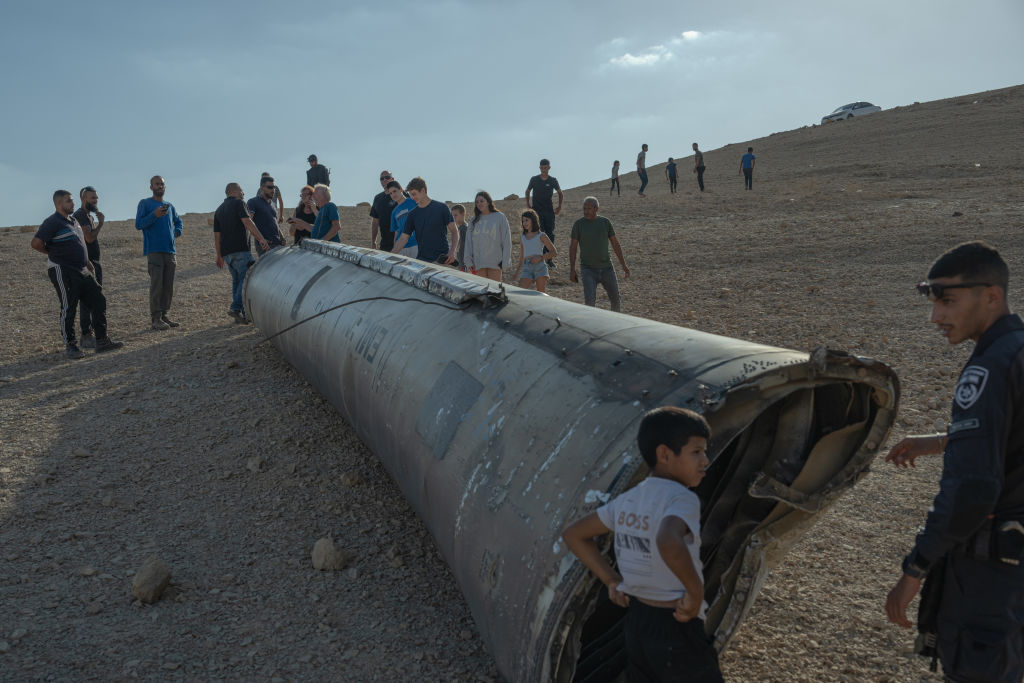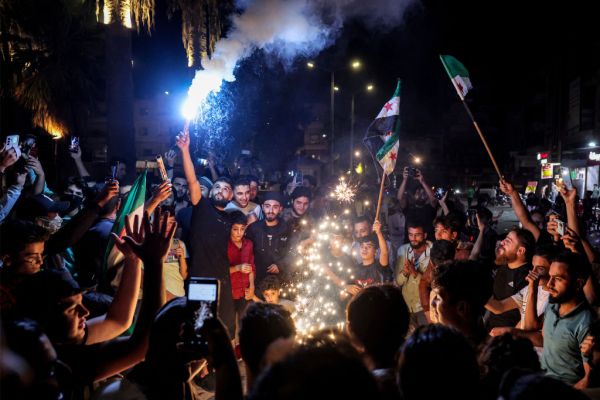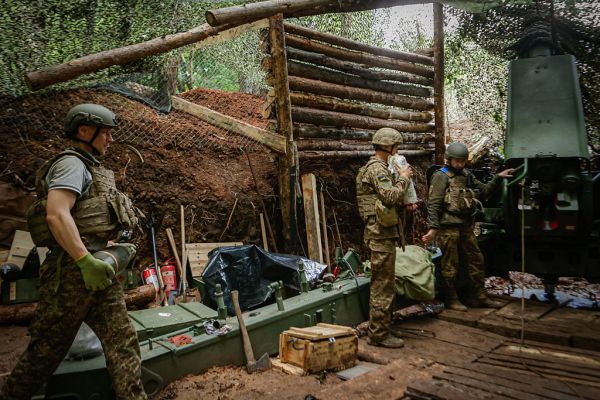Happy Thursday! And a happy new year to all of our readers celebrating Rosh Hashanah!
Quick Hits: Today’s Top Stories
- President Joe Biden told reporters on Wednesday he wouldn’t support an Israeli retaliation against Iran that targeted the country’s nuclear facilities. Biden’s comments came after a call with Group of Seven leaders that discussed new sanctions against Iran in the wake of its Tuesday ballistic missile attack on Israel. Israel is in the process of preparing a military response to the attack. “We will be discussing with the Israelis what they are going to do,” Biden added. “All seven of us agree that they have a right to respond, but they should respond proportionally.”
- Israel on Wednesday reported its first casualties from ground operations in southern Lebanon. The Israel Defense Forces (IDF) confirmed that eight soldiers had been killed in combat with Hezbollah and at least a half dozen others wounded. The IDF also announced that additional infantry and armored brigades would join the campaign to push Hezbollah away from the Israeli border.
- U.S. District Court Judge Tanya Chutkan unsealed a motion in special counsel Jack Smith’s election interference case against former President Trump. The 165-page filing offered a fuller picture of Smith’s evidence against Trump. Part of the brief detailed a scene on January 6 when an aide told Trump that Vice President Mike Pence had been taken to a secure location as rioters stormed the Capitol. “So what,” Trump allegedly said in reaction. The motion argued that the judge should consider Trump’s attempts to subvert the 2020 election results as the conduct of a losing candidate, not the official acts of a president protected by the Supreme Court’s immunity ruling in July.
- Department of Homeland Security Secretary Alejandro Mayorkas said Wednesday that the Federal Emergency Management Agency (FEMA) doesn’t have enough money to make it through the remainder of the hurricane season. “We are meeting the immediate needs with the money that we have,” he said. “We are expecting another hurricane hitting—we do not have the funds, FEMA does not have the funds, to make it through the season.” Forecasters are currently tracking a storm system in the Gulf of Mexico that could potentially grow into a hurricane. Meanwhile, the death toll from Hurricane Helene rose on Wednesday to at least 191, making it the second deadliest hurricane in the U.S. in the last 50 years.
- The Ukrainian military withdrew from Vuhledar, a town in the eastern Donetsk region, on Wednesday after holding the area against Russian attacks for two years. The Russian military has cast Vuhledar as a strategic gain, but analysts with the Institute for the Study of War stated that Russia’s seizure of the town is “unlikely to fundamentally alter the course of offensive operations in western Donetsk.” Still, the withdrawal highlighted the success of Russia’s better-resourced and grinding campaign. Meanwhile, Russian President Vladimir Putin signed a law Wednesday allowing criminal suspects to avoid a trial if they join the military.
- A boat carrying more than 300 passengers on the Niger River in Nigeria capsized on Tuesday, resulting in the deaths of at least 60 people, according to local authorities. Approximately 80 people were still missing as of Wednesday. Accidents on the river are a frequent problem; last month, 40 people died after a boat capsized in northwest Nigeria.
Israelis Brace for What Comes Next

Across the world, Jews are today celebrating Rosh Hashanah, the Jewish New Year, and looking to the end of the year “and its curses.”
It has been nearly a full year of curses since Iran’s proxies launched a series of brutal attacks on Israel. The Israel Defense Forces (IDF) have now expanded the war into southern Lebanon in an effort to push back Hezbollah and allow Israelis who fled the north to return to their homes. And Iran on Tuesday targeted it directly with close to 200 ballistic missiles.
As Israel racks up significant victories against Hezbollah, it remains to be seen how the Israeli government will respond to Iran’s attacks—though signs point to an aggressive counterattack meant to further degrade Tehran and its weakened proxies.
Hezbollah, up until recently, had been the largest and best equipped of those proxies spread across the Middle East. From its stronghold in southern Lebanon and with its arsenal of well over 100,000 Iranian-supplied missiles and rockets within striking distance of strategic Israeli targets, the terrorist organization existed in part to deter Israel from striking Iran.
Since mid-September, though, all that has likely changed. Over the course of several weeks, Israel has systematically dismantled Hezbollah, killing functionally all of its senior leadership—including Hassan Nasrallah, the longtime leader of the group, in a massive airstrike on the outskirts of Beirut on Friday. Israel also has aggressively struck Hezbollah’s arsenal of weapons—much of which is hidden under and among civilian infrastructure.
U.S. and Israeli officials now say that Israel has destroyed around half of Hezbollah’s weapons, the New York Times reported, accumulated over decades. And Israel has succeeded in convincing Lebanon to turn around inbound Iranian flights to the Beirut airport, keeping Tehran from quickly rearming the group.
On Tuesday morning, Israel said that it had begun “limited, localized, and targeted” ground operations inside Lebanon to continue targeting Hezbollah’s weapons stores. The IDF announced on Wednesday that eight IDF soldiers were killed in Lebanon in recent days as the U.S. organized a charter flight for Americans and their family members to leave the country.
Hundreds of thousands of Lebanese civilians have fled the area south of the Litani River near the Lebanon-Israel border. An IDF spokesman said on Tuesday that the army had uncovered evidence that Hezbollah was using border towns as a staging ground for an October 7-style attack on northern Israel—plans the IDF said it has disrupted. “Hezbollah turned Lebanese villages next to Israeli villages into military bases,” said Rear Adm. Daniel Hagari, an IDF spokesman. “Hezbollah planned to invade Israel, attack Israeli communities, and massacre innocent men women, and children. They called this plan ‘Conquer the Galilee.’”
Israel’s goal of returning Israelis to the north would require confidence that no such plan could come to fruition. Hezbollah’s elite Radwan forces—the inspiration for the Hamas Nukhba fighters who led the October 7 massacre—have trained for decades to carry out a cross-border attack on Israeli civilian and military sites. In Israeli forces’ recent raids into southern Lebanon, Hagari said, the military found extensive evidence of such a plan, including hidden weapons caches near the border and maps with detailed information about Israel’s northern communities.
Against that backdrop, Iran on Tuesday evening local time fired some 180 ballistic missiles at Israel—only the second time in Israel’s history that Iran has directly attacked the country, with the first being an April 13 strike which was almost entirely repelled.
Tuesday’s attack seemed ultimately to be as ineffective as Iran’s April effort although it did slightly more damage to civilian infrastructure than did the attack in the spring. One man, a Palestinian living in the West Bank, was killed during the strike, which Iran called retaliation for the deaths of Ismail Haniyeh, the political head of Hamas assassinated in Tehran in July, and Nasrallah. Most of the missiles were intercepted by the combined efforts of U.S. and Israeli air defenses, but some struck the outskirts of Tel Aviv and near a military base in southern Israel. The bombardment also came minutes after a combined shooting and stabbing in south Tel Aviv that killed seven people—Israel’s deadliest terrorist attack since October 7—and whose perpetrators from the West Bank were later claimed by Hamas, which receives extensive Iranian arms and funding in the Palestinian territory.
With Hezbollah degraded and troops on the ground in Lebanon, Israel’s strategic calculus about the severity of its coming response may have shifted since April, when it retaliated with a pinpoint strike on an Iranian air defense system. “We should just reset all of our assumptions and the strategic paradigms that we’ve been operating under for a long time,” Richard Goldberg, former director for countering Iranian weapons of mass destruction for the White House National Security Council under former President Donald Trump and a senior adviser at the Foundation for Defense of Democracies, said Wednesday. “I think we should assume that the target is … the top strategic threats to Israel,” potentially including Iran’s fixed missile launchers and stockpiles, air defenses, key infrastructure, or the sites of its nuclear program.
Former Israeli Prime Minister Naftali Bennett on Wednesday called for strikes on Israeli nuclear program infrastructure. Iran is now thought to be capable of producing sufficient nuclear material for a bomb in just one to two weeks should it decide to, and some analysts worry it might make a dash to weaponize with Hezbollah’s deterrence now degraded. “Israel has now its greatest opportunity in 50 years, to change the face of the Middle East,” Bennett posted on X. “We must act *now* to destroy Iran’s nuclear program, its central energy facilities, and to fatally cripple this terrorist regime.”
The U.S. initially struck a supportive tone in the immediate aftermath of Tuesday’s strike, endorsing Israeli retaliation and condemning Iran’s escalation—in marked contrast to President Joe Biden’s entreaty in April for Prime Minister Benjamin Netanyahu to “take the win.”
By Wednesday, though, the Biden administration had begun to walk back that more full-throated support. “The answer is no,” Biden told reporters when asked whether Israel should strike Iran’s nuclear sites. Following a meeting of the Group of Seven leaders—heads of the world’s largest industrialized democracies—Biden said they were collectively urging caution. “All seven of us agree that they have a right to respond, but they should respond proportionally,” he said.
But Israeli officials are vowing “significant retaliation”—reportedly zeroing in on Iran’s oil refineries or air defenses, perhaps bolstered by clandestine actions from assets on the ground in Iran—which Iranian leaders have said will result in another attack. “We have a big question mark about how the Iranians are going to respond to an attack, but we take into consideration the possibility that they would go all in, which will be a whole different ball game,” an Israeli official told Axios’ Barak Ravid. In that case, subsequent Israeli attacks could see nuclear program targets on the table, Ravid reported.
For now, the Israeli government is publicly expressing resolve. “We are in the middle of a tough war against Iran’s axis of evil, which seeks to destroy us,” Netanyahu said Wednesday when announcing the deaths of the eight IDF soldiers. “This will not happen because we will stand together, and with God’s help, we will win together.”
Worth Your Time
- With thousands of dock workers on strike, Noah Smith explored the dangers of the International Longshoremen’s Association’s (ILA) job action for the economy, the labor movement, and innovation. “Is it right that the livelihoods of millions of Americans should hang on the whims of 50,000 dockworkers?” Smith asked in his Substack, Noahpinion. “Is it smart to give a single union the power to shut down a large portion of America’s critical infrastructure? … The worst thing about this strike is the nature of the ILA’s demands. Usually we think of strikes as being about higher wages, and maybe about better working conditions. The ILA’s wage demands are actually pretty close to being met. But the union is also demanding a complete ban on automation at the ports it controls. In fact, port automation is already heavily discouraged, both by the ILA’s existing contract, and by Department of Transportation Rules that stipulate that automation is never allowed to reduce the number or quality of jobs. But now the ILA wants to ban automation completely.”
- Today marks exactly one year since Kevin McCarthy was booted from the House speakership by insurgents in his own conference. Writing for NOTUS, Haley Byrd Wilt examined the aftermath of the ouster. “In interviews with more than a dozen House Republicans ahead of the anniversary of McCarthy’s removal, lawmakers said they are still emotionally recovering,” Wilt wrote. “They blamed those frenetic, frustrating weeks for thwarting GOP priorities and ratcheting up tensions among members. But they also agreed, regardless of where they stood during the fight, that the rebellion didn’t meaningfully change much of anything about how the House operates as an institution, like McCarthy’s detractors—upset that he had struck a deal with Democrats to fund the government—had hoped. … ‘There are many tragedies of the McCarthy ouster,’ South Dakota Rep. Dusty Johnson said. ‘But I think the eight renegades who ousted him have to acknowledge that they didn’t fundamentally change anything about the House.’”
Presented Without Comment
Associated Press: Prosecutors Say They May Bring Additional Charges Against New York City Mayor and Indict Others
Also Presented Without Comment
J.D. Vance in Tuesday’s vice presidential debate after Tim Walz said he’s sensitive to misspeaking: “Me too, man.”
Vance on Wednesday at a rally in Michigan, describing Walz’s debate misstatement about being friends with school shooters: “That was probably only the third or fourth dumbest comment Tim Walz made that night, then.”
Also Also Presented Without Comment
The Guardian: Melania Trump Passionately Defends Abortion Rights in Upcoming Memoir
“Restricting a woman’s right to choose whether to terminate an unwanted pregnancy is the same as denying her control over her own body. I have carried this belief with me throughout my entire adult life.”
In the Zeitgeist
A trailer dropped this week for a courtroom thriller that could possibly be 94-year-old filmmaker and Hollywood legend Clint Eastwood’s final production.
Toeing the Company Line
- Young people today are being inundated by progressive and populist rage—but we believe there are millions of students out there who have tuned out of the crazy and are just looking for common sense. They should be Dispatch members, whether or not they’ve heard of us yet. You can help us reach this cohort of common-sense, conservative young Americans by sponsoring a student subscription. Your generosity can help us steer the next generation toward better journalism, more thoughtful discourse, and a more hopeful future. You can sponsor a student subscription at the link here. Thanks for your consideration.
- In the newsletters: The Dispatch Politics crew reported on Tuesday night’s debate, Scott assessed (🔒) the last six years of U.S. economic policy toward China, Nick unpacked (🔒) Vance’s very demure, very mindful debate performance, and Jonah argued (🔒) that while Vance beat Walz in the debate, it might not actually help the Trump ticket.
- On the podcasts: Kannon Shanmugam joins Sarah and David on Advisory Opinions to discuss his recent speech pushing back against efforts to discredit the judiciary and Jonah is joined by Stirewalt on The Remnant to provide some rank post-veep debate punditry.
- On the site: Ahmed Fouad Alkhatib examines Hamas’ false polling and how Palestinians are tired of being used as pawns of the terrorist group. And Nick Hafen explains the issues at stake in the antitrust trial involving Google’s ad business.
Let Us Know
Should Israel target Iranian nuclear sites?











Please note that we at The Dispatch hold ourselves, our work, and our commenters to a higher standard than other places on the internet. We welcome comments that foster genuine debate or discussion—including comments critical of us or our work—but responses that include ad hominem attacks on fellow Dispatch members or are intended to stoke fear and anger may be moderated.
With your membership, you only have the ability to comment on The Morning Dispatch articles. Consider upgrading to join the conversation everywhere.